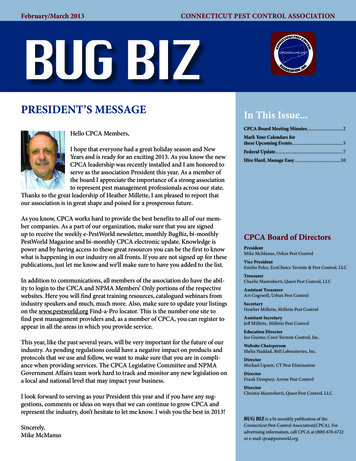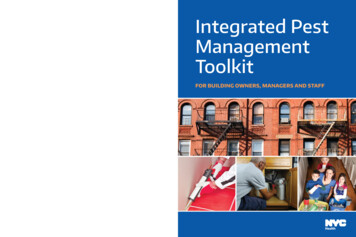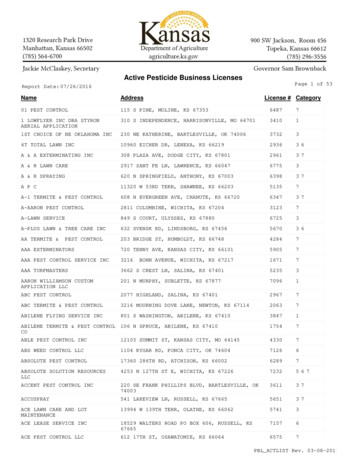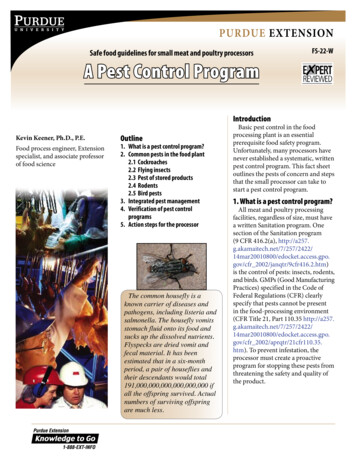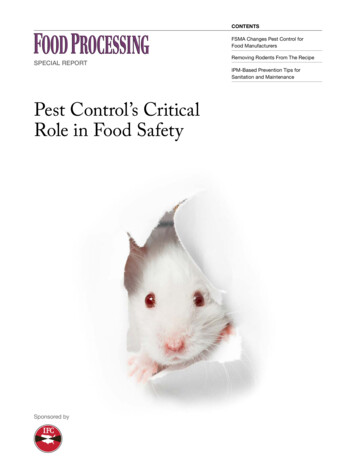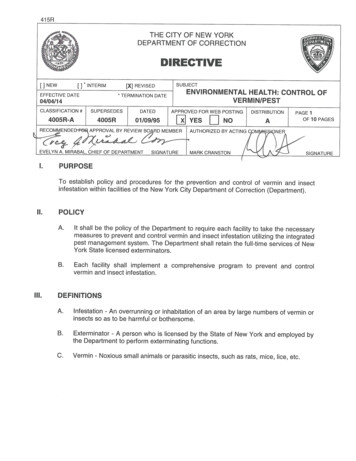
Transcription
Pest Control Industry Award1. - TITLEThis award shall be known as the Pest Control Industry Award.1B. - MINIMUM ADULT AWARD WAGE(1)No employee aged 21 or more shall be paid less than the minimum adult award wage unless otherwiseprovided by this clause.(2)The minimum adult award wage for full-time employees aged 21 or more is 692.90 per week payableon and from the commencement of the first pay period on or after 1 July 2016.(3)The minimum adult award wage is deemed to include all State Wage order adjustments from StateWage Case Decisions.(4)Unless otherwise provided in this clause adults employed as casuals, part-time employees or pieceworkers or employees who are remunerated wholly on the basis of payment by result shall not be paidless than pro rata the minimum adult award wage according to the hours worked.(5)Employees under the age of 21 shall be paid no less than the wage determined by applying thepercentage prescribed in the junior rates provision in this award to the minimum adult award wage.(6)The minimum adult award wage shall not apply to apprentices, employees engaged on traineeships orJobskill placements or employed under the Commonwealth Government Supported Wage System or toother categories of employees who by prescription are paid less than the minimum award rate, providedthat no employee shall be paid less than any applicable minimum rate of pay prescribed by theMinimum Conditions of Employment Act 1993.(7)Liberty to apply is reserved in relation to any special category of employees not included here orotherwise in relation to the application of the minimum adult award wage.(8)Subject to this clause the minimum adult award wage shall –(9)(a)Apply to all work in ordinary hours.(b)Apply to the calculation of overtime and all other penalty rates, superannuation, paymentsduring any period of paid leave and for all purposes of this award.Minimum Adult Award WageThe rates of pay in this award include the minimum weekly wage for employees aged 21 or morepayable under the 2016 State Wage order decision. Any increase arising from the insertion of theminimum wage will be offset against any equivalent amount in rates of pay received by employeeswhose wages and conditions of employment are regulated by this award which are above the wagerates prescribed in the award. Such above award payments include wages payable pursuant toenterprise agreements, consent awards or award variations to give effect to enterprise agreements andover award arrangements. Absorption which is contrary to the terms of an agreement is not required.Increases under previous State Wage Case Principles or under the current Statement of Principles,excepting those resulting from enterprise agreements, are not to be used to offset the minimum wage.(10)Adult Apprentices(a)Notwithstanding the provisions of this clause, an apprentice, 21 years of age or more, shall notbe paid less than 593.90 per week on and from the commencement of the first pay period onor after 1 July 2016.
(b)The rate paid in the paragraph above to an apprentice 21 years of age or more is payable onsuperannuation and during any period of paid leave prescribed by this award.(c)Where in this award an additional rate is expressed as a percentage, fraction or multiple of theordinary rate of pay, it shall be calculated upon the rate prescribed in this award for the actualyear of apprenticeship.(d)Nothing in this clause shall operate to reduce the rate of pay fixed by the award for an adultapprentice in force immediately prior to 5 June 2003.2. – 15.16.17.18.19.20.21.22.TitleMinimum Adult Award WageArrangement(deleted)Area and Scope(deleted)HoursOvertimeSick LeaveHolidaysAnnual LeaveContract of ServiceRecordCountry WorkVehicle AllowanceLocation AllowancesEquipmentLong Service LeaveBereavement LeavePosting of Award and Union NoticesWagesNational Training WageSuperannuationPayment of WagesAppendix – Resolution of Disputes RequirementSchedule A. – Named Parties to the Award3. - AREA AND SCOPEThis award shall have effect throughout the State of Western Australia and shall apply to all employeesemployed in the callings described in Clause 19 of this award.5. – HOURS(1)(a)The provisions of this clause apply to all employees other than those engaged on shift work.Subject to the provisions of subclauses (3) and (4) of this clause the ordinary hours of workshall be an average of 38 per week to be worked on one of the following bases:(i)38 hours within a work cycle not exceeding seven consecutive days; or(ii)76 hours within a work cycle not exceeding fourteen consecutive days; or
(iii)114 hours within a work cycle not exceeding twenty-one consecutive days; or(iv)152 hours within a work cycle not exceeding twenty-eight consecutive days; or(v)where the ordinary hours being worked each day exceed 8 hours on any day, anyother work cycle during which a weekly average of 38 ordinary hours are worked; or(vi)for the purposes of paragraph (g) of subclause (3) of this clause any other work cycleduring which a weekly average of 38 ordinary hours are worked as may be agreed inaccordance with paragraph (g) of subclause (3).(b)The ordinary hours of work may be worked on any or all days of the week, Monday to Fridayinclusive and where the employer and employee agree, may be worked on any 5 days of theweek, Monday to Saturday inclusive provided that any agreement to work ordinary hours onSaturday’s shall be recorded in writing, signed by the employer and the employee and storedwithin the employer’s time and wages records.(c)Except in the case of shift employees, ordinary hours shall be worked between the hours of6.00am and 6.00pm, provided that the spread of hours may be altered by agreement betweenthe employer and the majority of employees in the plant, section or sections concerned.(d)The ordinary hours of work shall not exceed 10 in any day provided that in any arrangementof ordinary working hours where the ordinary working hours are to exceed eight on any day,the arrangement of hours shall be subject to agreement between the employer and the majorityof employees in the enterprise, section or sections concerned.(e)Ordinary hours worked on a Saturday shall be paid for at 1.5 times the employee’s ordinaryhourly rate.(f)The ordinary hours of work shall be consecutive except for a meal break which shall not bemore than 1 hour or less than 30 minutes and:(h)(i)An employee shall not be compelled to work for more than five hours without a mealinterval except where an alternative arrangement is entered into as a result ofdiscussions as provided for in subclause (4) of this clause.(ii)By arrangement between an employer and the majority of employees in the plant,section or sections concerned, an employee or employees may be required to work inexcess of five hours, but not more than six hours, at ordinary rates of pay without ameal break.(iii)The time of taking a scheduled meal break or rest break by one or more employeesmay be altered by the employer if it is necessary to do so in order to meet operationalrequirements.(iv)An employer may stagger the time of taking a meal or rest break to meet operationalrequirements.(v)Where an employee is instructed by the employer to continue working during theemployee’s usual meal interval and the meal interval is postponed for more than halfan hour, the employee shall be paid at overtime rates until the employee receives theirmeal interval.(i)Subject to the provisions of this paragraph, a rest period of seven minutes from thetime of ceasing work to the time of resuming work shall be allowed each morning.(ii)The rest period shall be counted as time off duty without deduction of pay and shallbe arranged at a time and in a manner to suit the convenience of the employer.
(3)(a)(iii)Refreshments may be taken by employees during the rest period but the period ofseven minutes shall not be exceeded under any circumstances.(iv)An employer who satisfies the Commission that any employee has breached anycondition expressed or implied in this paragraph shall be exempted from liability toallow the rest period.Except as provided in paragraph (d) of this subclause the method of implementing the 38 hourweek may be any of the following:(i)by employees working less than 8 ordinary hours each day; or(ii)by employees working less than 8 ordinary hours on one or more days each week; or(iii)by fixing one day of ordinary working hours on which all employees will be off dutyduring a particular work cycle; or(iv)by rostering employees off duty on various days of the week during a particular workcycle so that each employee has one day of ordinary working hours off duty duringthat cycle; or(v)except in the case of shift employees, where the ordinary hours of work are worked inaccordance with an arrangement as provided in sub-paragraphs (iii) or (iv) of thisparagraph, any day off duty shall be arranged so that it does not coincide with aholiday prescribed in subclause (1) of Clause 8. – Holidays of this Award.(b)In each enterprise, an assessment should be made as to which method of implementation bestsuits the business and the proposal shall be discussed with the employees concerned, theobjective being to reach agreement on the method of implementation.(c)In the absence of agreement at the enterprise level, the procedure for resolving special,anomalous or extraordinary problems shall be for the employer to discuss the matter with theState Secretary or Assistant State Secretary of the union and if still not resolved the matter willbe referred to the Western Australian Industrial Relations Commission.(d)Different methods of implementing a 38-hour week may apply to various groups or sections ofemployees in the plant or establishment concerned.(e)Notice of days off dutyExcept as provided in paragraphs (f) and (g) of this subclause in cases where, by virtue of thearrangement of ordinary hours an employee, in accordance with sub-paragraphs (iii) and (iv)of paragraph (a) of this subclause, is entitled to a day off duty during the work cycle, then suchemployee shall be advised by the employer at least four weeks in advance of the day to betaken off duty provided that a lesser period of notice may be agreed between the employer andthe employee concerned.(f)(g)(i)An employer, with the agreement of the majority of employees concerned, maysubstitute the day an employee is to take off in accordance with sub-paragraphs (iii)and (iv) of paragraph (a) of this subclause hereof, for another day in the case of abreakdown in machinery or a failure or shortage of electric power to meet therequirements of the business in the event of rush orders or some other emergencysituation.(ii)An employer and an employee may by agreement substitute the day an employee is totake off with another day.Flexibility in relation to rostered days off
Notwithstanding any other provision in this clause, where the hours of work in the enterpriseor section concerned are organised in accordance with sub-paragraphs (iii) and (iv) ofparagraph (a) of this subclause an employer, the union or unions concerned and the majorityof employees in the enterprise, section or sections concerned may agree to accrue up to amaximum of five rostered days off in special circumstances such as where there are regularand substantial fluctuation in operational requirements in any year.Where such agreement has been reached the accrued rostered days off must be taken withintwelve months from the date of accrual.The union shall be consulted about accruing rostered days off where they have members inany enterprise or the affected section or sections.(4)Shift Work(a)The provisions of this clause apply to shift work whether continuous or otherwise.(b)An employer may work employees on shifts but before doing so shall give notice of theintention to the employees concerned and, where the union has members in areas affected bythe shiftwork, to the union of the intended starting and finishing times of ordinary workinghours of the respective shifts.(c)Where any particular process is carried out on shifts other than day shift, and less than fiveconsecutive afternoon or five consecutive night shifts are worked on that process, thenemployees employed on such afternoon or night shifts shall be paid at overtime rates.Provided that where the ordinary hours of work are normally worked on less than five daysthen the provision of this paragraph shall be as if that number of consecutive shifts wassubstituted for five consecutive shifts.(d)The sequence of work shall not be deemed to be broken under paragraph (c) by reason of thefact that work on the process is not carried out on a Saturday or Sunday or any other day thatthe employee does not normally work for the purpose of implementing a 38-hour week or onany holiday.(e)A shift employee when on afternoon or night shift shall be paid, for such shift fifteen percentmore than the employee’s ordinary rate prescribed by this award.(f)All work performed on a shift the major proportion of which falls on a Saturday shall be paidfor at the rate of time and one half and such allowance shall be paid in lieu of the shiftallowance prescribed in paragraph (e) of this clause.(g)All work performed on a shift the major proportion of which falls on a Sunday shall be paidfor at the rate of time and three quarters and such allowance shall be paid in lieu of the shiftallowance prescribed in paragraph (e) of this clause.(h)All work performed on a shift the major proportion of which falls on a Public Holiday shall bepaid for at the rate of double time and such allowance shall be paid in lieu of the shiftallowance prescribed in paragraph (e) of this clause.(i)Time worked in excess of ordinary hours on any shift shall be paid at overtime ratesunless the extra hours worked:(i)are due to private arrangements between the employees themselves;(ii)do not exceed two hours and is due to a relieving employee not coming on duty at theproper time; or(iii)are for the purpose of effecting the customary rotation of shifts.
6. - OVERTIME(1)Except as hereinafter mentioned, all work performed in excess of or outside the ordinary daily workinghours Monday to Saturday inclusive shall be paid at the rate of time and one half for the first two hoursand double time thereafter.(2)All work performed on Sundays shall be paid for at the rate of double time with a minimum payment asfor three hours.(3)All work performed on any of the holidays prescribed in subclause (1) of Clause 8 hereof shall be paidfor at the rate of double time and a half with a minimum payment as for three hours.(4)(a)When an employee without being notified on the previous day or earlier is required tocontinue working after the completion of ordinary hours on any day for more than two hourshe shall be provided with any meal required or be paid 8.15 in lieu thereof.(b)If the amount of overtime required to be worked necessitates a second or subsequent meal, theemployer shall provide such meal(s) or pay an amount of 5.65 for each second or subsequentmeal.(c)If an employee as a consequence of receiving such notice of overtime, has providedthemselves with a meal or meals and is not required to work overtime or is required to workless overtime than notified they shall be paid the amounts prescribed in paragraphs (a) and (b)of this subclause in respect of the meals provided and not then required.(d)The provisions of this subclause do not apply where the employee can reasonably return homefor a meal.(5)An employee shall not be compelled to work for more than five hours without a break for a meal.(6)(a)When an employee is recalled to work after leaving the job he shall be paid for at least threehours at overtime rates.(b)Time reasonably spent in getting to and from the job shall be counted as time worked.(7)Time Off In Lieu of Overtime(a)By agreement between an employer and the affected employee, the employee may take paidtime off instead of being paid for overtime worked.(b)Such time off shall be taken at a time mutually agreed between the employer and theemployee and shall be taken on the basis of one hour’s time off without loss of pay duringordinary working hours for each hour of overtime worked.(c)If the employee is not given the time off in lieu of overtime within 12 months from theovertime being worked or prior to the termination of their employment, the overtime shall bepaid as though it would have had their been no agreement to take time off in lieu.7. - SICK LEAVE(1)(a)An employee who is unable to attend or remain at his place of employment during theordinary hours of work by reason of personal ill health or injury shall be entitled to paymentduring such absence in accordance with the following provisions.(b)Entitlement to payment shall accrue at the rate of one sixth of a week for each completedmonth of service with the employer.
(c)If in the first or successive years of service with the employer an employee is absent on theground of personal ill health or injury for a period longer than his entitlement to paid sickleave, payment may be adjusted at the end of that year of service, or at the time the employee'sservices terminate, if before the end of that year of service, to the extent that the employee hasbecome entitled to further paid sick leave during that year of service.(2)The unused portions of the entitlement to paid sick leave in any one year shall accumulate from year toyear and subject to this clause may be claimed by the employee if the absence by reason of personal illhealth or injury exceeds the period for which entitlement has accrued during the year at the time of theabsence. Provided that an employee shall not be entitled to claim payment for any period exceedingten weeks in any one year of service. Provided further that the provisions of this subclause shall applyonly to service on or after the date of the Order hereof.(3)To be entitled to payment in accordance with this clause the employee shall as soon as reasonablypracticable advise the employer of his inability to attend for work, the nature of his illness or injury andthe estimated duration of the absence. Provided that such advice, other than in extraordinarycircumstances shall be given to the employer within 24 hours of the commencement of the absence.(4)The provisions of this clause do not apply to an employee who fails to produce a certificate from amedical practitioner dated at the time of the absence or who fails to supply such other proof of theillness or injury as the employer may reasonably require provided that the employee shall not berequired to produce a certificate from a medical practitioner with respect to absences of two days orless unless after two such absences in any year of service the employer requests in writing that the nextand subsequent absences in the year if any, shall be accompanied by such certificate.(5)(a)Subject to the provisions of this subclause, the provisions of this clause apply to an employeewho suffers personal ill health or injury during the time when he is absent on annual leave andan employee may apply for and the employer shall grant paid sick leave in place of paidannual leave.(b)Application for replacement shall be made within seven days of resuming work and then onlyif the employee was confined to his place of residence or a hospital as a result of his personalill health or injury for a period of seven consecutive days or more and he produces a certificatefrom a registered medical practitioner that he was so confined. Provided that the provisions ofthis paragraph do not relieve the employee of the obligation to advise the employer inaccordance with subclause (3) of this clause if he is unable to attend for work on the workingday next following his annual leave.(c)Replacement of paid annual leave by paid sick leave shall not exceed the period of paid sickleave to which the employee was entitled at the time he proceeded on annual leave and shallnot be made with respect to fractions of a day.(d)Where paid sick leave has been granted by the employer in accordance with paragraphs (a),(b) and (c) of this subclause, that portion of the annual leave equivalent to the paid sick leaveis hereby replaced by the paid sick leave and the replaced annual leave may be taken atanother time mutually agreed to by the employer and the employee or, failing agreement, shallbe added to the employee's next period of annual leave or, if termination occurs before then,be paid for in accordance with the provisions of Clause 9. - Annual Leave.(e)Payment for replaced annual leave shall be at the rate of wage applicable at the time the leaveis subsequently taken provided that the annual leave loading prescribed in Clause 9. - AnnualLeave shall be deemed to have been paid with respect to the replaced annual leave.(6)Where a business has been transmitted from one employer to another and the employee's service hasbeen deemed continuous in accordance with subclause (3) of clause (2) of the Long Service Leaveprovisions published in volume 62 of the Western Australian Industrial Gazette at pages 1-6, the paidsick leave standing to the credit of the employee at the date of transmission from service with thetransmittor shall stand to the credit of the employee at the commencement of service with thetransmittee and may be claimed in accordance with the provisions of this clause.
(7)The provisions of this clause with respect to payment do not apply to employees who are entitled topayment under the Workers' Compensation Act nor to employees whose injury or illness is the result ofthe employee's own misconduct.8. - HOLIDAYS(1)The following days, or the days observed in lieu shall, subject to Clause 6 hereof, be allowed asholidays without deduction of pay, namely New Year's Day, Australia Day, Good Friday, EasterMonday, Anzac Day, Labour Day, Foundation Day, Sovereign's Birthday, Christmas Day and BoxingDay. Provided that another day may be taken as a holiday by arrangement between the parties, in lieuof any of the days named in this subclause.(2)When any of the days mentioned in paragraph (1) hereof, falls on a Saturday or a Sunday the holidayshall be observed on the next succeeding Monday, and when Boxing Day falls on a Sunday or aMonday the holiday shall be observed on the next succeeding Tuesday. In each case the substitutedday shall be a holiday without deduction of pay and the day for which it is substituted shall not be aholiday.9. - ANNUAL LEAVE(1)Except as hereinafter provided a period of four consecutive weeks' leave with payment as prescribed inthis clause shall be allowed annually to an employee by his employer after a period of twelve months'continuous service with such employer.(2)(a)An employee before going on leave shall be paid wages he would have received with theaddition of a 17½ per cent loading calculated on his ordinary rate of wage in respect of theordinary time he would have worked had he not been on leave during the relevant period.(b)The loading prescribed by this subclause shall not apply to proportionate leave on termination.(a)If after one month's continuous service in any qualifying twelve monthly period, an employeelawfully leaves his employment or his employment is terminated by the employer through nofault of the employee, the employee shall be paid 3.08 hours' pay at his ordinary rate of wagein respect of each completed week of continuous service in that qualifying period.(b)An employee whose employment terminates after he has completed a twelve monthlyqualifying period and who has not been allowed the leave prescribed under this clause inrespect of that qualifying period shall be given payment as prescribed in lieu of that leave or,in lieu of so much of that leave as has been allowed unless -(3)(i)he has been justifiably dismissed for misconduct; and(ii)the misconduct for which he has been dismissed occurred prior to the completion ofthat qualifying period.(4)Any time in respect of which an employee is absent from work except time for which he is entitled toclaim sick pay or time spent on holidays or annual leave as prescribed by this award, shall not count forthe purpose of determining his right to annual leave.(5)In special circumstances and by mutual consent of the employer and the employee, annual leave maybe taken in not more than two periods.10. – CONTRACT OF SERVICE(1)Except in the case of casual employees, the contract of service may be terminated by notice or paymentin lieu of notice given by either side in accordance with the following table:
Period of Continuous ServiceNot more than 1 yearMore than 1 year but not more than 3 yearsMore than 3 years but not more than 5 yearsMore than 5 yearsPeriod of NoticeAt least 1 weekAt least 2 weeksAt least 3 weeksAt least 4 weeks(2)The period of notice that must be given by an employer when terminating an employee who is over 45years old and who has completed at least 2 years continuous service with the employer shall be workedout by ascertaining the amount of notice required to be given under subclause (1) of this clause andincreasing that notice by a further one week.(3)Provided that nothing in this clause entitles the employee to notice or payment in lieu of notice wherethey are dismissed for serious misconduct that justifies instant dismissal, including malingering,inefficiency or neglect of duty, and an employee so dismissed shall be paid for the time worked up tothe time of the dismissal only.(4)If payment in lieu of notice is given, that payment must at least equal the total of all amounts that theemployer would have been liable to pay to the employee had their employment continued during thenotice period and must be worked out on the basis of:(a)the employee’s ordinary hours of work (even if they are not standard hours); and(b)the amounts ordinarily payable to the employee in respect of those hours, including (forexample) allowances, loadings and penalties; and(c)any other amounts payable under the employee’s contract of employment.(5)The period of notice required to be given under this clause shall not apply in the case of casualemployees, trainees or employees engaged for a specific period of time or for a specific task or tasks.(6)Standing Down of Employees(a)(i)An employer may deduct payment for any day or part of a day that an employee cannot be usefully employed because of industrial action by the union party to this awardor any other association or union.(b)(ii)If an employee is required to attend for work on any day but because of failure orshortage of electric power or breakdown of the employer’s plant, vehicle orequipment or through any other cause that the employer could not reasonablyprevent, work is not provided, the employee shall be provided with two hour’s payand where the employee commences work they shall be provided with four hour’semployment or be paid for four hour’s worked.”(7)The period of notice required to be given to a casual employee shall be one hour and if the requirednotice is not given, one hour’s wages shall be paid by the employer or forfeited by the employee.(8)Part time Employment(a)A part time employee may be engaged to work for a constant number of hours each weekwhich having regard to the various ways of averaging ordinary hours shall average less than38 hours per week.(b)An employee so engaged shall be paid per hour one thirty-eighth of the weekly wageprescribed for the classification in which the employee is engaged.(c)An employee engaged on a part time basis shall be entitled in respect of annual leave,holidays, sick leave and bereavement leave arising under this award payment on aproportionate basis calculated having regard to the proportion the hours worked by them bearsto 38 hours.
11. - RECORD(1)The employer shall keep a time and wages record showing the name of each employee, the nature ofhis work, the hours worked each day and the wages and allowances paid each week. Any system ofautomatic recording by means of machines shall be deemed to comply with the provision to the extentof the information recorded.(2)Keeping of, and access to, employment records is provided for in sections 49D and 49E of theIndustrial Relations Act, 1979.12. - COUNTRY WORK(1)Where an employee is engaged or selected or advised by the employer to proceed to country work atsuch a distance that he cannot return to his home each night and the employee does so, the employershall provide the employee with suitable board and lodging or shall pay the expenses reasonablyincurred by the employee for board and lodging.(2)(a)The employer shall pay all reasonable expenses including fares, transport of tools, meals and,if necessary, suitable overnight accommodation incurred by an employee who is directed byhis employer to proceed to country work and who complies with such direction.(b)The employee shall be paid at ordinary rate of payment for the time up to a maximum of eighthours in any one day incurred in travelling pursuant to the employer's direction.13. - VEHICLE ALLOWANCE(1)Where an employee is required and authorised to use his own motor vehicle in the course of his dutieshe shall be paid an allowance not less than that provided for in the table set out hereunder.Notwithstanding anything contained in this subclause the employer and the employee may make anyother arrangement as to car allowance not less favourable to the employee.(2)Where an employee in the course of a journey travels through two or more of the separate areas,payment at the rates prescribed herein shall be made at the appropriate rate applicable to each of theseparate areas traversed.(3)A year for the purpose of this clause shall commence on the 1st day of July and end on the 30th day ofJune next following.Rates of Hire for Use of an Employee’s Own Vehicle on Employer’s BusinessArea and DetailsMetropolitan AreaSouth West Land DivisionNorth of 23.5 South LatitudeRest of the StateMotor Cyc
Pest Control Industry Award 1. - TITLE This award shall be known as the Pest Control Industry Award. . Absorption which is contrary to the terms of an agreement is not required. . Contract of Service 11. Record 12. Country Work 13. Vehicle Allowance 14. Location Allowances 15. Equipment

